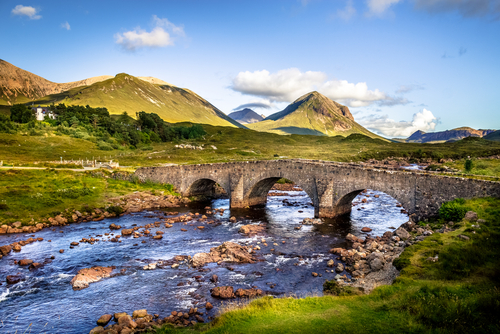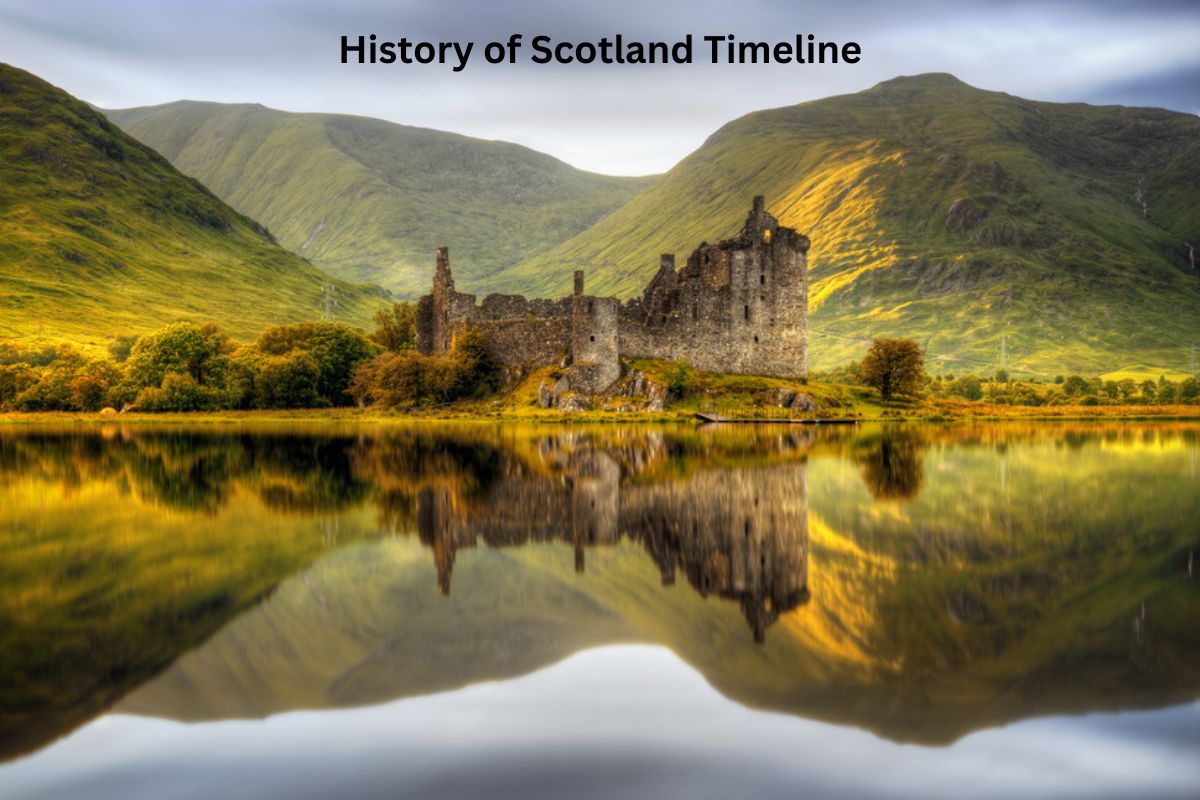Scotland’s history is a captivating tale of ancient cultures, struggles, enlightenment, and enduring traditions.
From prehistoric times to the modern era, Scotland’s story includes Mesolithic hunter-gatherers, Roman invasions, unification of clans, and the intellectual brilliance of the Scottish Enlightenment.
The 19th and 20th centuries brought industrialization and societal changes, while contemporary Scotland grapples with issues of independence and devolution.
In this exploration of Scotland’s history, we will uncover the nation’s rich heritage and its global impact.
| Period | Key Events and Developments |
|---|---|
| Prehistoric Scotland | – c. 8500 BC: Mesolithic hunter-gatherers inhabit what is now Scotland. – c. 4000 BC: Neolithic settlements and stone circles, like Skara Brae in Orkney, are established. – c. 2000 BC: Bronze Age begins with the introduction of metalworking. |
| Iron Age and Early Medieval Scotland | – c. 700 BC: Iron Age Celts settle in Scotland. – 43 AD: Romans invade southern Scotland, establishing the Antonine Wall. – 5th-6th centuries: Arrival of the Scots, Gaels, and Picts. – 843: Kenneth MacAlpin unites the Picts and Scots, becoming the first King of Alba. |
| Medieval Scotland | – 11th century: Macbeth, King of Scotland, reigns. – 1296: Edward I of England captures Scotland during the First War of Scottish Independence. – 1314: Battle of Bannockburn, led by Robert the Bruce, results in Scottish independence. – 1603: Union of the Crowns, as James VI of Scotland becomes James I of England and Ireland. |
| Early Modern Scotland | – 1707: Act of Union merges Scotland and England into the Kingdom of Great Britain. – 1746: Battle of Culloden marks the end of Jacobite uprisings and Highland culture. – Late 18th century: Scottish Enlightenment, a period of intellectual and cultural growth. |
| 19th and 20th Century | – 19th century: Industrialization transforms Scotland with coal mining, shipbuilding, and textiles. – 1930s-1950s: Highland Clearances displace many rural Scots. |
| Contemporary Scotland | – 1997: Scotland gains its own parliament through devolution. – 2014: Scotland holds a referendum on independence, but voters choose to remain part of the United Kingdom. – 2016: The United Kingdom votes to leave the European Union, despite a majority of Scots voting to remain. – 2021: Scottish Parliament elections result in a pro-independence majority, reigniting discussions about Scottish independence. |
Scottish History Timeline
1. Prehistoric Scotland:
In the ancient past, Scotland was inhabited by Mesolithic hunter-gatherers around 8500 BC. These early people relied on the rich natural resources of the land for their survival.
As time progressed, the Neolithic era emerged around 4000 BC, characterized by the establishment of settled communities and the construction of remarkable stone circles and monuments, such as the famous Skara Brae on the Orkney Islands.
Also Read: History of England Timeline
The advent of the Bronze Age, approximately around 2000 BC, marked a significant shift with the introduction of metalworking technology, which had a profound impact on tools, weaponry, and trade networks in the region.

2. Iron Age and Early Medieval Scotland:
During the Iron Age, which began around 700 BC, the Celtic culture took root in Scotland. These Iron Age Celts cultivated the land and developed their own unique social structures.
In 43 AD, the Romans made their presence felt by invading southern Scotland and constructing the Antonine Wall, which served as a northern boundary of the Roman Empire. However, the Roman influence in Scotland was limited, and they eventually withdrew.
Also Read: Welsh History Timeline
The subsequent centuries witnessed the arrival of various ethnic groups, including the Scots, Gaels, and Picts. These diverse cultures coexisted and sometimes clashed in what is now Scotland.
In 843, Kenneth MacAlpin emerged as a unifying figure by becoming the first King of Alba, consolidating the Pictish and Scottish realms into a more cohesive entity.
3. Medieval Scotland:
The medieval period in Scotland was marked by a series of significant events and rulers. One of the most famous figures from this era is Macbeth, who ruled in the 11th century and is the central character in William Shakespeare’s play “Macbeth.”
The First War of Scottish Independence began in 1296 when Edward I of England captured Scotland, initiating a struggle for Scottish sovereignty. The iconic Battle of Bannockburn in 1314, led by Robert the Bruce, resulted in a crucial victory for the Scots, securing their independence.
Another pivotal moment in Scotland’s history occurred in 1603 when James VI of Scotland ascended to the English throne as James I, unifying the crowns of England and Scotland.
This union would eventually lead to the formation of the Kingdom of Great Britain in 1707 through the Act of Union, a significant event that reshaped the political landscape of Scotland.

4. Early Modern Scotland:
The early modern period in Scotland was marked by political and intellectual transformation. In 1707, the Act of Union came into effect, merging the kingdoms of Scotland and England into the Kingdom of Great Britain.
This union had far-reaching implications for Scottish politics and economy, as Scotland became a partner in the expanding British Empire.
One of the most significant events of this era was the Battle of Culloden in 1746, which marked the end of Jacobite uprisings in Scotland. The defeat of the Jacobites, who sought to restore the Stuart monarchy, had a profound impact on Highland culture and resulted in the suppression of traditional Highland dress and clan structures.
The late 18th century saw the emergence of the Scottish Enlightenment, a period of intellectual and cultural growth. Enlightenment thinkers like David Hume, Adam Smith, and James Watt made significant contributions to philosophy, economics, and science, shaping the intellectual landscape not only in Scotland but also around the world.
5. 19th and 20th Century:
The 19th century brought profound changes to Scotland’s economy and society. Industrialization transformed the country, with coal mining, shipbuilding, and textiles becoming major industries.
The rapid growth of cities like Glasgow and Edinburgh was a testament to this industrial boom. However, it also led to harsh working conditions and the rise of labor movements.
During the 19th century, the Highland Clearances took place, displacing many rural Scots from their ancestral lands. Landowners cleared their estates for more profitable sheep farming, leading to mass emigration, particularly to North America, and the erosion of traditional Highland culture.

6. Contemporary Scotland:
In 1997, Scotland gained its own parliament through devolution, allowing for greater self-governance in areas like education, healthcare, and transportation while remaining part of the United Kingdom. The Scottish Parliament, based in Edinburgh, has since played a key role in shaping domestic policies and laws specific to Scotland.
In 2014, Scotland held a referendum on independence from the United Kingdom. Although the “No” vote prevailed, it sparked renewed interest in the question of Scottish independence. The issue remained at the forefront of political discourse.
In 2016, the United Kingdom voted to leave the European Union through the Brexit referendum, despite a majority of Scots voting to remain. This created tensions between the Scottish government and the UK government, as Scotland sought to maintain its ties with the EU.
7. Recent Developments:
In 2021, Scottish Parliament elections resulted in a pro-independence majority, with the Scottish National Party (SNP) winning a plurality of seats. This renewed the debate over Scottish independence, with the SNP pushing for a second independence referendum.
The relationship between Scotland and the rest of the United Kingdom remains a central issue in contemporary Scottish politics, as discussions around independence continue to evolve in response to changing political and economic dynamics, both in Scotland and the wider UK.
